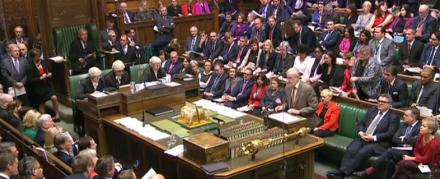
After the second leadership election in a year, the enthusiasm of most members for another year of internal strife is strictly limited. We’ve all irritated each other at different times, but there’s a pretty broad consensus that some sort of accommodation needs to be found to enable the party to resume working as an effective Opposition. What should such an accommodation look like?
First, some assumptions.
- Jeremy will almost certainly win, though much of what follows would also apply if Owen won.
- Almost nobody thinks that a party split would be helpful to anyone – on the contrary, it would almost certainly lead to massive seat losses for all sides.
- It’s very difficult to organise systematic de-selections, for the reasons set out by Luke Akehurst on this site, and there is no real effort to make it happen on a national scale.
So post-September 24, we will still have Jeremy as leader representing the membership and a PLP who mostly have a record of lack of confidence in him. What should we do to deal with that? Some constructive suggestions:
- Let’s agree to treat past statements as irrelevant. You’re an MP and said you had no confidence in Corbyn? “That was then, since then the membership has confirmed him, he’s developed in the job and we’ve all agreed to move on.” Stick to that line without embroidery. Or you’re an activist and your MP once said something rude about Jeremy? If she or he is willing to move on, so should you be (if Jeremy isn’t letting it rankle, why should you?). Politics is too important to obsess about the past.
- Forget about a third leadership election before 2020. Once was necessary when Ed stood down. Twice was perhaps understandable in view of the PLP unrest. Three would be ridiculous. At some point the result of elections needs to be respected, and we’ve reached it.
- Let’s hold advisory PLP Shadow Cabinet elections. Binding the hands of the leader is unrealistic, not least as if elected to Downing Street the leader can appoint anyone they like. Moreover, the MPs who have stuck by Jeremy and performed effectively in the Commons (John McDonnell, Angela Rayner and Rachael Maskell spring to mind, and there are plenty more) have earned the right not to be dumped at the first opportunity. But as a move to reach out to the PLP, let’s see who would command their confidence best and include them in senior positions. There is an element of self-selection here: by standing, the candidates accept that the boycott of the Shadow Cabinet is over, and if there’s anyone who isn’t willing to, then by definition they aren’t suited to be shadow ministers at the moment.
- Let’s try to expand our reach at PMQs and elsewhere to issues that we’re not particularly associated with. Everyone accepts that Jeremy and his team can be trusted not to wade into supporting reckless military interventions, that they’ll oppose austerity and be supportive for refugees. But the big pre-Conference hit was Jeremy’s triumph over grammar schools, and we need to be persuasive on Brexit, on the economy and on the cost of living (which will become a bigger issue as the falling pound starts to affect imports). John McDonnell has done a lot of effective work on developing a coherent economic policy – let’s use it. As for Brexit, instead of just jeering that the Tories don’t know what they want, we need to say what we want. A call for a fresh referendum or election on a Brexit deal will only look credible if we can show that our expectations were not met.
- Let’s link the planned academies for activists with a well-informed analysis of the targeted strategy that served the Tories well at the 2015 election. We have plenty of social media experts and need to get them involved – the “human wave” approach of delivering dozens of generic leaflets to marginal seats is simply outdated, and we need to do intelligent canvassing that identifies voter concerns with relevant follow-up.
We aren’t splitting up, and we have a great deal in common. It’s time to focus on that. In fact, you know, it’s long overdue.
Nick Palmer was Labour MP for Broxtowe between 1997 and 2010.



More from LabourList
Key local council elections to watch for clues on our general election chances
Andy Burnham manifesto: Greater Manchester mayor reveals three key election pledges in bid for third term
‘Labour should grasp the chance to secure EU visa deal for young workers’